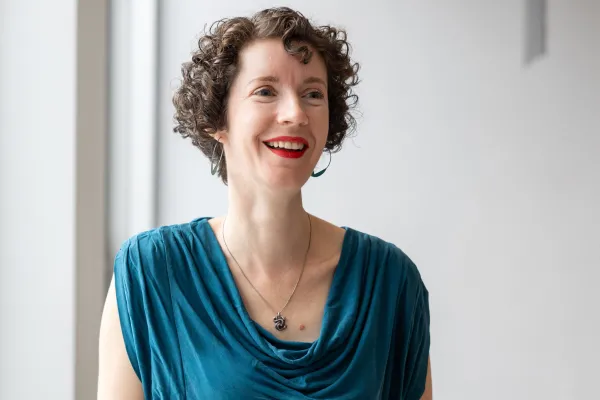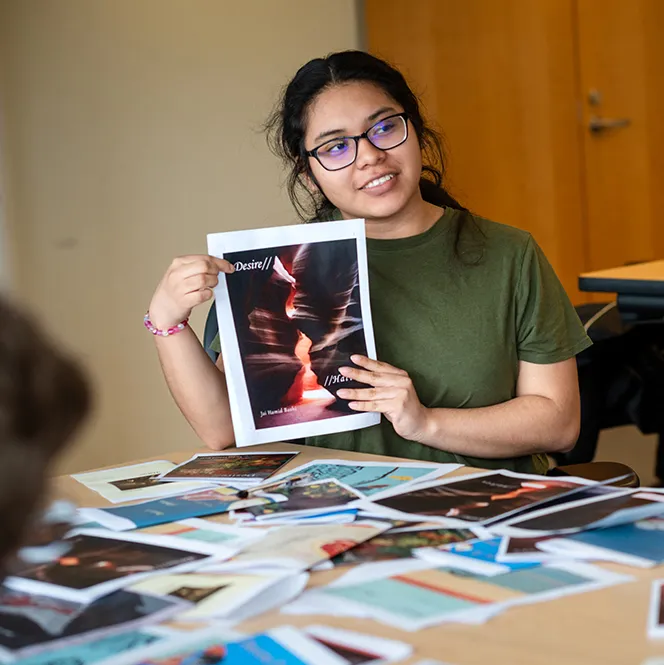Shaping the Future of Poetry, One Chapbook at a Time
Smith Quarterly
Smith is the first women’s college to have its own poetry press
Adrie Rose AC ’22 is excited about the current state of poetry and burgeoning interest in the genre. Photograph by Jessica Scranton
Published October 11, 2024
When Adrie Rose AC ’22 began updating gender statistics on literary prizes during her internship at Perugia Press in Florence, Massachusetts, she uncovered a stark reality: Major literary honors still overwhelmingly favor men. “I understand sexism exists,” Rose says, “but when you see those hard numbers, it really drives home just how big that rift is.”
Another troubling fact: Not one women’s college had its own poetry press. Rose, an American studies major who completed the poetry concentration, set out to make Smith the first. With its rich history of supporting poetry and poets and its commitment to inclusion and equity, Smith seemed like the perfect place to launch a chapbook press that would provide publishing opportunities for poets whose voices and work have often been overlooked. As Rose examined the data, she realized a critical barrier to recognition for many poets. “You’re never going to get a Pulitzer if you never get published in the first place,” she points out, emphasizing the need for such a platform.
She proposed her idea to Matt Donovan, professor of practice in English language and literature and director of The Boutelle-Day Poetry Center, and Jennifer Blackburn, the center’s program and outreach coordinator. “They had thought about doing something like this before,” Rose says, “but it had never been feasible.” Suddenly, it was: In 2020, the Tammis Day Foundation gave $10 million to the poetry center in honor of the late Tammis Day AC ’05. The foundation’s support enabled the Boutelle-Day Poetry Center to expand its reach, making it possible to launch a press.
There were two crucial components to Rose’s vision. First, the press would accept annual submissions solely from poets who identify as female, trans, or nonbinary and select one manuscript to publish as a chapbook. Second, Smith students would play an integral role in the press through an editorial class in the fall and a graphic design class in the spring, both taught by Rose.
Named Nine Syllables Press (9SP), the new press received 296 submissions for its 2024 publication. Last fall, students narrowed the manuscripts down to 10, which were then sent to this year’s judge, poet Leila Chatti, the 2022 Grace Hazard Conkling Writer-in-Residence at Smith, who chose Desire/Halves by Jai Hamid Bashir of Salt Lake City, Utah, to be the press’s first publication, set for release this fall. “It’s a really cool, fun book,” says Rose, who serves as the Tammis Day Editorial Fellow and editor of 9SP. “It grapples with language and displacement, the imagery is lovely, and I think some of the personalness of the work is part of what really touched students.” In addition to having her work published, Bashir will receive $500 in cash and the opportunity to read at Smith.
In the past, chapbooks—which are usually no more than 40 pages—were seen as an affordable steppingstone to publishing a full volume of work. Today, they are seen as an art form unto themselves, perfect as a vehicle for exploring an idea or theme or experimenting with format—even for established writers. “People like Leila Chatti, Rick Barot, Victoria Chang—these are poets who are very well known, widely published, have multiple full-length books out, but they still come back to the chapbook,” Rose says. “To have a really limited amount of space sometimes allows for more creativity because you have that constraint. For some people, that’s an exciting tool.”
Yaretsy Castro ’24 studied chapbook design with Rose in spring 2024.
Photograph by Shana Sureck
As a student, Rose established a connection with Ross White of chapbook publisher Bull City Press in Durham, North Carolina. White was an enthusiastic mentor of Rose’s, happy to guide her and the poetry center through the nitty-gritty of establishing a press. In fact, it was White who came up with the name 9SP as a tribute to Sylvia Plath ’55 and her poem “Metaphors,” which begins, “I am a riddle in nine syllables.” “It’s a fantastic poem,” Rose says. “She compresses a ton of information into a small space, which, of course, is what chapbooks do. It made a lot of sense, and we loved it.”
The press’s production process will follow the same schedule each year. In the fall semester course, The Chapbook in Practice: Publishing, students get an overview of how the publishing industry works by reading and evaluating submitted manuscripts. Although an interest in poetry is not a prerequisite for the class, students must submit their own work—whether poetry or some other form of the written word—to a publication so they experience “what it’s like to put your work into the void and not hear back,” Rose says.
The spring semester course, The Chapbook in Practice: Design, starts with the history of printmaking, the basics of book design, and the process of turning a manuscript into a book. By the spring, the winning manuscript has been chosen, so students focus on themes and recurring images in the work, which may be used to illustrate the cover. “In Desire/Halves, fruit comes up again and again,” Rose says, “and there are several animals that appear throughout. These are images that were used in the students’ covers.”
Students can elect to take one or both semesters of the course. “Having the students involved adds to the complexity and the diversity of the press,” Rose says. “And we offer students this incredible opportunity to work in the industry while they’re still in school. It gives them a chance to see what it’s like.” This, coupled with the fact that students’ decisions have genuine consequences, creates an intense experience. “They are doing something that affects people’s lives,” Rose says, “which is both exciting and scary.”
English major Jenna Chadwick ’25 believes that the creation of 9SP and the involvement of students has the potential to reshape the publishing landscape. “With such an immense focus on white male voices, the surge of AI, and the classism involved in securing an agent or ‘Big Five’ publisher”—Penguin Random House, Hachette Book Group, HarperCollins, Simon & Schuster, and Macmillan—“we wanted to make sure that in each aspect of our process, we were actively working against the harmful practices in the greater publishing industry,” Chadwick says.
Rose, who says her work with The Boutelle-Day Poetry Center renewed her belief in the power of poetry as both an art form and a career, is excited about the current state of poetry and burgeoning interest in the genre. “We’ve seen the world of poetry really just explode in the last 20 years in so many fantastic ways,” she says, “including people experimenting with form and themes.”
Rules she learned as a young poet have been tossed aside, and Rose sees students coming in with far fewer limitations about what a poem is. “I love poetry even though we are constantly butting up against what language can do and what language fails to do,” she says. “There’s so much about our experience and the world that we can’t put into language. But people do find ways—it happens all the time. That’s when poetry allows us to open the door—just a crack—into people’s hearts and minds. And we need those cracks for new things to come in. ”

